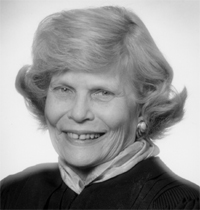|
Joyce Hens Green
Ruth Joyce Martha Hens Green (November 13, 1928 – October 10, 2024) was an American lawyer who served as a United States district judge of the United States District Court for the District of Columbia from 1979 to 2024. Education and careerBorn in New York City on November 13, 1928,[2] Green graduated from the University of Maryland, College Park, receiving a Bachelor of Arts degree in 1949. She entered the University of Maryland School of Law and transferred to the George Washington University Law School, receiving a Juris Doctor from that institution in two years, in 1951. She also received an honorary Doctor of Laws from George Washington University in 1994 and has been named a Distinguished Alumnus of Towson High School. Green practiced law in the District of Columbia and Virginia until she was appointed Associate Judge of the Superior Court of the District of Columbia in 1968, where she served for over a decade.[3] Federal judicial serviceOn March 6, 1979, President Jimmy Carter nominated Green to be a United States district judge of the United States District Court for the District of Columbia, to a seat vacated by Judge Howard Francis Corcoran. She was confirmed by the United States Senate on May 10, 1979, and received her commission on May 11, 1979. She assumed senior status on July 1, 1995, and was succeeded by Henry H. Kennedy Jr., who had also succeeded her on the Superior Court bench.[4] Green was a member of the United States Foreign Intelligence Surveillance Court (FISC) from May 1988 until May 1995, and served as its presiding judge from May 1990 until May 1995.[3] Significant casesIRS v. The Church of ScientologyIn 1992, Judge Green ruled in favor of the Church of Scientology in the case of Church of Scientology v. Internal Revenue Service on a pretrial motion for summary judgment. Release of BCCI's frozen assetsOn September 1, 1995, Green ordered $393 million seized from the Bank of Credit and Commerce International turned over to the bank's victims.[1] BCCI had been involved in criminal activity and its assets had been freed in 1992. Green had heard, and ruled on, three challenges to the release of the seized funds. FEC v. The Christian CoalitionGreen ruled against the Federal Election Commission in Federal Election Commission v. The Christian Coalition Civil Action No. 96-1781 Opinion & Order; and Judgment, filed August 2, 1999.[2][3] The FEC had challenged the propriety of the Christian Coalition's distribution of voter guides, on the grounds it had been too closely tied to large corporate donors. But, Green's 108-page judgment had supported the FEC in two instances; when the Christian Coalition had broken FEC guidelines in their explicit advocacy of the re-election of Newt Gingrich; and when the Christian Coalition had handed over their membership list to Senate candidate Oliver North. In re Guantanamo Detainee CasesFollowing the United States Supreme Court ruling in Rasul v. Bush (2004), which determined that detainees had the right of habeas corpus and due process to challenge their detention before an impartial tribunal, many habeas corpus cases were filed on behalf of detainees at Guantanamo Bay detention camp. On September 15, 2004, Judge Green was appointed the coordinating judge for all Guantanamo Bay habeas corpus cases.[4] On January 31, 2005, Judge Green ruled that: (1) detainees had the fundamental Fifth Amendment right not to be deprived of liberty without due process of law; Personal life and deathShe married Samuel Green in 1965 and had two sons and a daughter.[1] Her husband died in 1983.[1] Hens Green died from acute myeloid leukemia in Towson, Maryland on October 10, 2024, at the age of 95.[1][3][6] Notes
See alsoReferences
External links
|
||||||||||||||||||||||||||||||||||||||||||||||||||||
